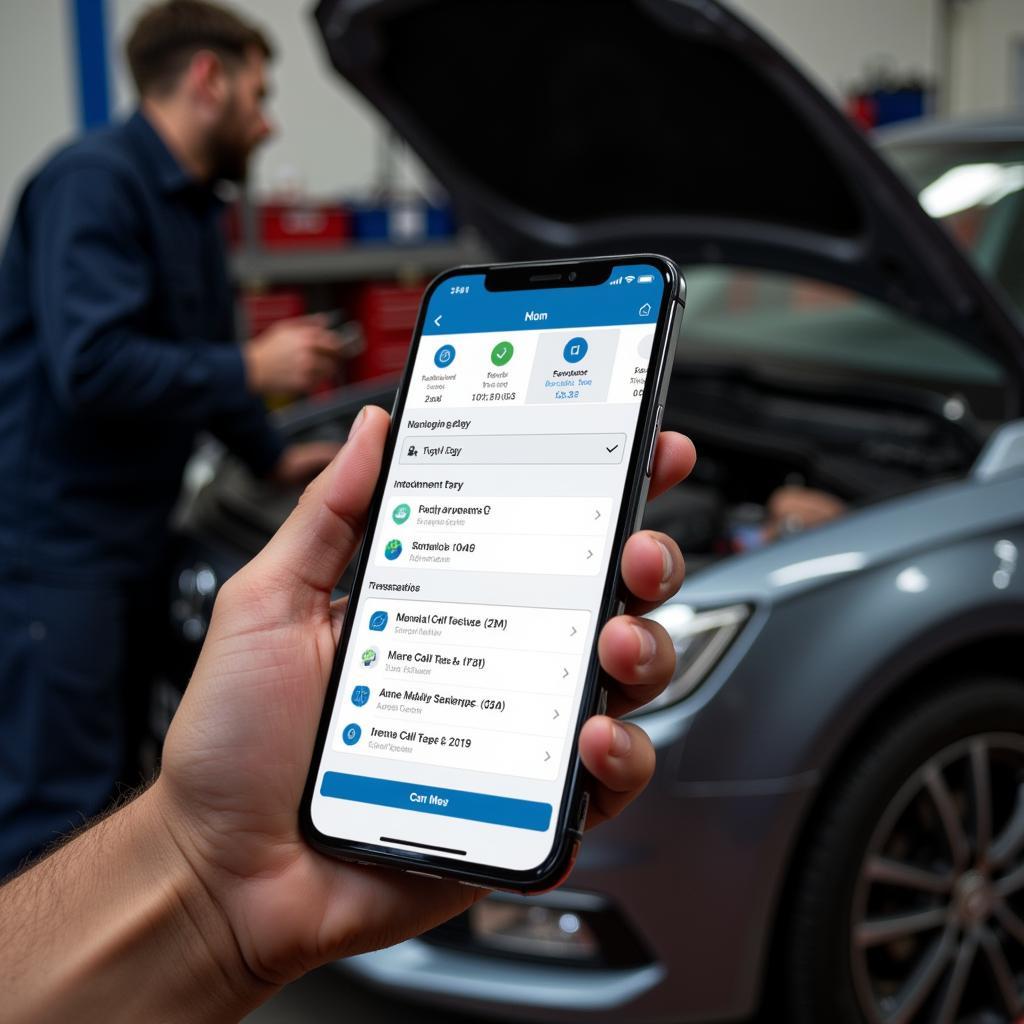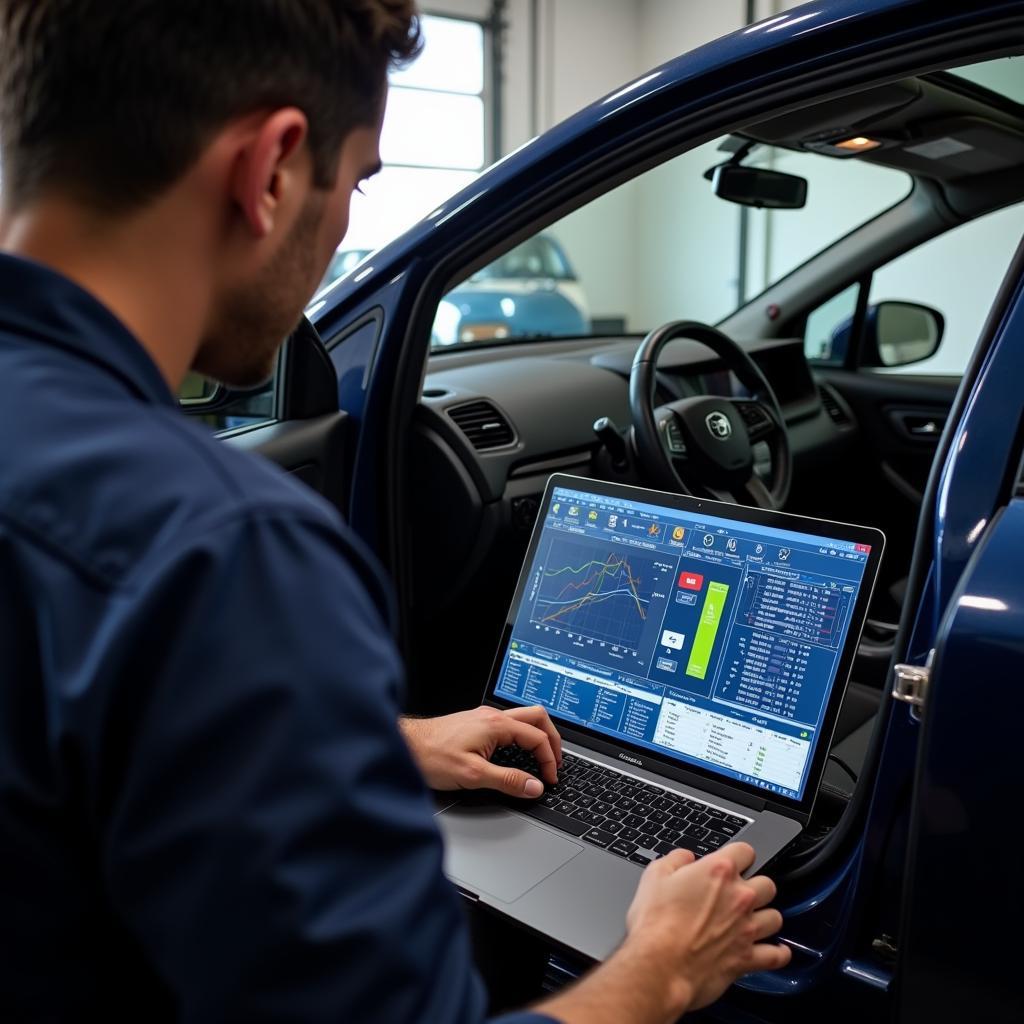Finding the right diagnostic software for your car can feel like navigating a maze. With countless options flooding the market, each promising to be the ultimate solution, how do you choose the best one for your needs? This guide will equip you with the knowledge to confidently select the ideal diagnostic software for any vehicle.
 Choosing the Right Diagnostic Software
Choosing the Right Diagnostic Software
Understanding the Importance of Diagnostic Software
Before delving into the specifics, let’s address why diagnostic software is crucial for car owners and professionals alike. Gone are the days of relying solely on mechanical expertise and intuition to pinpoint car problems. Today’s vehicles are complex machines with intricate electronic systems.
Diagnostic software acts as a window into these systems, reading and interpreting the data they generate. This enables you to:
- Identify the root cause of car problems: Accurately pinpoint the source of issues, from engine misfires to ABS malfunctions.
- Save time and money: Avoid unnecessary repairs and part replacements by identifying the exact problem area.
- Stay ahead of potential issues: Monitor your car’s health and address minor problems before they escalate.
- Gain a deeper understanding of your vehicle: Access valuable information about your car’s performance and history.
Types of Diagnostic Software for All Cars
The world of car diagnostic software offers diverse options, each tailored to different needs and expertise levels. Let’s explore the most common types:
1. OBD-II Scanners
These are the most basic and affordable type of diagnostic software, connecting to your car’s OBD-II port, a standard feature in vehicles manufactured after 1996.
Key Features:
- Read and clear basic diagnostic trouble codes (DTCs).
- Display real-time engine data, such as RPM, speed, and coolant temperature.
- Offer basic functionality for troubleshooting engine-related issues.
Ideal For:
- Car owners seeking a simple and budget-friendly option for basic diagnostics.
- DIY enthusiasts looking to understand and resolve minor car problems.
2. Professional Diagnostic Software
Professional-grade software offers advanced functionality and comprehensive coverage for various vehicle makes and models.
Key Features:
- Access to a vast database of DTCs with detailed explanations.
- Perform advanced diagnostics on various vehicle systems, including engine, transmission, ABS, airbags, and more.
- View live data streams from multiple sensors simultaneously.
- Perform bi-directional control tests to activate specific vehicle components.
- Access manufacturer-specific data and functionalities.
Ideal For:
- Professional mechanics and technicians requiring comprehensive diagnostic capabilities.
- Garages and workshops dealing with a wide range of car makes and models.
 Professional Diagnostic Software in Action
Professional Diagnostic Software in Action
3. Manufacturer-Specific Software
As the name suggests, this type of software is designed specifically for a particular car brand, providing in-depth access to vehicle systems and data.
Key Features:
- Specialized diagnostic procedures and functionalities tailored to the specific car make.
- Access to manufacturer-specific DTCs and troubleshooting information.
- Perform advanced programming and coding of vehicle modules.
Ideal For:
- Specialized garages and dealerships working exclusively with a single car brand.
- Advanced DIY enthusiasts with in-depth knowledge of a particular car make.
Factors to Consider When Choosing Diagnostic Software
With a basic understanding of the types of software available, let’s explore the key factors to consider when making your selection:
- Vehicle Compatibility: Ensure the software supports your car’s make, model, and year of manufacture.
- Functionality: Determine your diagnostic needs and choose software that offers the required features.
- Ease of Use: Opt for user-friendly software with an intuitive interface and clear instructions.
- Updates: Choose software with regular updates to ensure compatibility with the latest vehicle models and technologies.
- Cost: Diagnostic software prices vary greatly; set a budget and select the best option within your price range.
Smart Car Diagnostics Software: The Future of Car Diagnostics
The evolution of car technology has paved the way for innovative diagnostic solutions, with smart car diagnostic software emerging as a game-changer.
What is Smart Car Diagnostic Software?
Smart car diagnostic software leverages the power of artificial intelligence (AI) and machine learning to provide advanced diagnostic capabilities and predictive analysis.
Key Advantages:
- Proactive Maintenance: Predict potential car problems before they arise, allowing for timely maintenance and preventing costly breakdowns.
- Personalized Insights: Receive tailored recommendations based on your car’s driving patterns, maintenance history, and diagnostic data.
- Remote Diagnostics: Access diagnostic information and receive alerts remotely through your smartphone or computer.
Download Diagnostic Software for Cars
Ready to take control of your car’s health? Explore DiagFixPro’s curated selection of diagnostic software options. We offer a range of choices to cater to different needs and budgets.
- Download Car Diagnostic Software: Find reliable and user-friendly diagnostic software options here.
- Car Diagnostic Download Software: Explore our collection of downloadable software solutions.
- Most Expensive Car Diagnostic Software: Discover the top-tier diagnostic software options with advanced functionalities.
Conclusion
Choosing the right Diagnostic Software For All Cars empowers you to understand and maintain your vehicle’s health effectively. By considering the factors outlined in this guide and exploring the available options, you can confidently select the ideal software to meet your specific needs. Remember, investing in the right diagnostic software is an investment in your car’s longevity and your peace of mind.
FAQs
1. Can I use diagnostic software on any car?
Diagnostic software compatibility varies depending on the software and the car’s make, model, and year of manufacture.
2. What is a DTC?
DTC stands for Diagnostic Trouble Code, a standardized code that indicates a specific malfunction detected in the vehicle’s system.
3. Do I need technical expertise to use diagnostic software?
The level of technical expertise required depends on the software’s complexity. Some offer basic functionality for beginners, while others require advanced knowledge.
4. Can diagnostic software fix car problems?
Diagnostic software primarily identifies car problems. While some software offers bi-directional control to test specific components, it doesn’t directly fix mechanical or electrical issues.
5. How often should I use diagnostic software on my car?
It’s recommended to run a diagnostic scan at least once a year or whenever you experience car trouble.
Common Car Diagnostic Scenarios:
Scenario 1: Check Engine Light Illuminates
Solution: Connect your diagnostic software to identify the specific DTC triggering the light and follow the recommended troubleshooting steps.
Scenario 2: Car Experiencing Reduced Fuel Efficiency
Solution: Use diagnostic software to monitor fuel trim readings and oxygen sensor data, which can indicate potential issues affecting fuel economy.
Scenario 3: ABS Warning Light Appears
Solution: Diagnostic software can pinpoint the faulty sensor or component within the Anti-lock Braking System (ABS).
Have other car diagnostic questions? Explore more informative articles and resources on DiagFixPro!
Need Assistance? Contact us via WhatsApp: +1(641)206-8880 or Email: [email protected]. Our 24/7 customer support team is here to help.

Leave a Reply